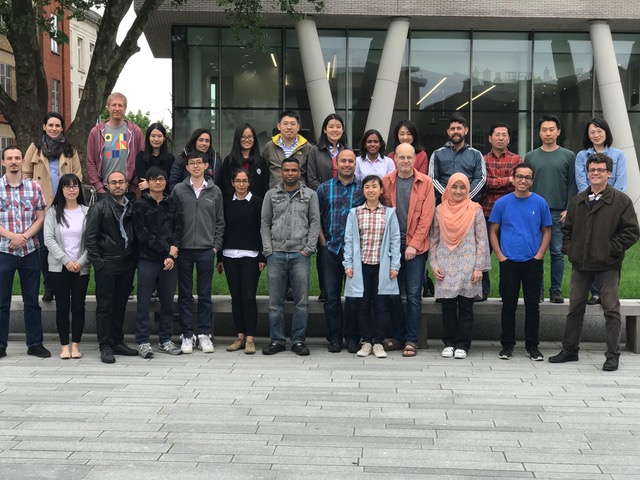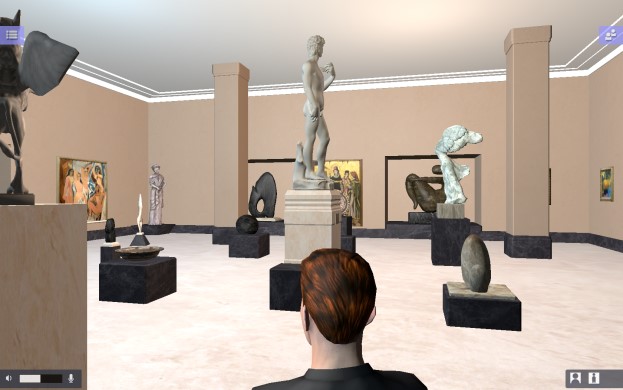Multimedia & Vision Research Group (MMV Group)
 Multimedia and Vision: MMV was founded in 2000 under the leadership of
Professor Izquierdo. Its mission was to complement other areas well represented
in the school, to push forward the frontiers of research in multimedia systems
technology and to spread excellence through teaching and outreach. The approach
taken has been multidisciplinary having no clear boundaries with other groups
in the school, while pursuing cooperation with renowned scientists and labs at
national and global level. Over the past 15 years, the group has made
substantial contributions in several fields of multimedia signal processing
including video compression, visual information retrieval and video analytics
for security applications.
Multimedia and Vision: MMV was founded in 2000 under the leadership of
Professor Izquierdo. Its mission was to complement other areas well represented
in the school, to push forward the frontiers of research in multimedia systems
technology and to spread excellence through teaching and outreach. The approach
taken has been multidisciplinary having no clear boundaries with other groups
in the school, while pursuing cooperation with renowned scientists and labs at
national and global level. Over the past 15 years, the group has made
substantial contributions in several fields of multimedia signal processing
including video compression, visual information retrieval and video analytics
for security applications.
Since its foundation, the group has secured over 30 large and medium sized
research grants with a total value exceeding £15 Million. A main source of
funding has been the EU, specifically within the FP6, FP7 and H2020 frameworks
in which the group attracted a large number of cooperative research project
with key players from the Industry including Thales, BT, The BBC, Huawei,
United Technologies, Philips, Telefonica, STMicroelectronics; Alcatel-Lucent
Bell and Disney Research, as well as, key European research groups as
Fraunhofer/Germany and INRIA/France.
Over the same period the four MMV's academic members graduated 60 PhD students,
published over 200 research papers in the highest ranked journals in multimedia
signal processing, e.g., IEEE Transactions, and filed several patents for video
coding technology and visual information retrieval.
Recent achievements
Since 2014 the group developed an improved fully scalable
video encoder and made several contributions to the MPEG standardisation body.
Related research was published in a series of eight IEEE transactions papers
with highest impact factor in the field. This work also led over the last five
years to £2 Million funding from the EU, DTI and EPSRC. During the same period,
the group also developed effective tools for content adaptation (up-sampling)
and enhancement, as well as, an improved, standard compliant high efficiency
video encoder and decoder system for UHD services (The Turing Codec). This
codec exploits deep-learning technology, it vastly outperforms state of the art
techniques, and has a high commercial potential. The Turing codec has been
jointly developed with The BBC.
Over the last five years the group has also made inroads in video analytics for
security application exploiting cooperation with The London Met and several
other European police forces. MMV has already received over £3 Million funding
in six cooperative projects addressing critical security application.
Future Strategy
Building on past achievements MMV's strategy has three main
pillars. First, the Turing Codec and the recently completed Cognitus System
will be exploited to strengthen cooperation with the BBC and potentially set
the basis for a joint research lab focusing on the needs of the future
broadcasting industry. The recently jointly completed Cognitus system already
offers an end-to-end platform to aggregate User Generated Content (UGC) during
events, enhance to Ultra-High Definition (UHD) quality and provide semantic
enrichment to facilitate the smooth integration in broadcast productions. The
corresponding technology is currently showcased in The BBC blue room and will
enable deeper cooperation and new jointly developments strengthening QMUL-BBC
data science partnership.
A second pillar of MMV's future strategy is to deepen research on video
analytics for security applications exploiting acquired partnership with policy
forces across Europe. Three large ongoing projects in the field will be used to
enhance MMV's related research and outcomes and to attract additional funding
to expand this area of work.
Additionally, group members are expanding research cooperation in the medical
domain with key medical schools as Karolinska/Sweden and QMUL Barts medical
school. The aim is to expand ongoing work on histology image understanding for
better cancer treatment and cure.
Fields of work
The MMV Research Group has over 30 members, including 4 members of academic staff and 2 post-doctoral researchers. The group is currently active in the following research areas of visual media engineering and computer vision:
- 3D Reconstruction and Graphics
- Video coding
- Analysis of (Human) Motion
- Semantic classification & clustering
- Human Sensing for Human-Media Interaction
- Colour Vision
International cooperation
 Substantial participation in a number of national and international cooperative projects have
enabled the group to initiate research collaborations with other world leading institutions
including: the University of California, Los Angeles; Berkley University, California; the
Northwestern University, Chicago; the University of Alberta, Edmonton; Intel, US. Several
European institutions take part as well to projects in collaboration with the group,
including: Motorola Research UK; British Telecom; Sony Research UK; the University of
Glasgow; the Heinrich Hertz Institute for Communication Technology, Berlin; the Technical
University of Berlin; the Technical University of Munich; Siemens Research Munich; the
German Research Centre for Artificial Intelligence; INRIA Research, France; the Groupe des
Ecoles des Télécommunications, Paris; the French Institut National de l'Audiovisuel; France
Telecom; Thomson France; the Ecole Polytechnique Fédérale de Lausanne, Switzerland;
Telefonica, Spain; General Electric, Switzerland.
Substantial participation in a number of national and international cooperative projects have
enabled the group to initiate research collaborations with other world leading institutions
including: the University of California, Los Angeles; Berkley University, California; the
Northwestern University, Chicago; the University of Alberta, Edmonton; Intel, US. Several
European institutions take part as well to projects in collaboration with the group,
including: Motorola Research UK; British Telecom; Sony Research UK; the University of
Glasgow; the Heinrich Hertz Institute for Communication Technology, Berlin; the Technical
University of Berlin; the Technical University of Munich; Siemens Research Munich; the
German Research Centre for Artificial Intelligence; INRIA Research, France; the Groupe des
Ecoles des Télécommunications, Paris; the French Institut National de l'Audiovisuel; France
Telecom; Thomson France; the Ecole Polytechnique Fédérale de Lausanne, Switzerland;
Telefonica, Spain; General Electric, Switzerland.
International connections are also related to the standardisation activities to which the group plays an active role, being involved in the MPEG standardization work.
Other esteem indicators
The group is highly active in the most relevant scientific societies, having an associated editor for an IEEE transactions journal, a member of the IEEE Signal Processing Society Multimedia Signal Processing Technical Committee and two members in the executive group of the IEE visual information engineering professional network, one of them acting as chairman of this important professional network.
A member of the group has been elected member of the Visual Signal Processing and Communications technical committee of the IEEE. One member is Associate Editor of the IEEE Transactions on Circuits and Systems for Video Technology. Group members have served as guest editor for 3 IEEE Transactions special issues, a IEE Proceeding special issue, a special issues of the EURASIP Journal of Applied Signal Processing, one special issue of the ELSEVIER Signal Processing: Image Communication Journal, a special issue of the Springer journal Signal, Image and Video Processing. A group member is associate editor of the Journal of Multimedia.
A number of successful conferences have been organised by the group. Among them:
- the International Workshop on Image Analysis for Multimedia Interactive Services (WIAMIS 2003) attracted over 120 researchers in April 2003;
- the 1st European Workshop on the Integration of Knowledge, Semantics and Digital Media Technology (EWIMT 2004), attracted over 100 researchers in November 2004;
- the 2nd European Workshop on the Integration of Knowledge, Semantics and Digital Media Technology (EWIMT 2005) attracted over 100 researchers in November 2005;
- the IEEE International Conference on Advanced Video and Signal based Surveillance (AVSS 2007) attracted 160 attendees in September 2007;
- the International Conference on Content Based Multimedia Indexing (CBMI 2008) was held in June 2008;
- the IET International Conference on Visual Information Engineering (VIE 2008) was held in July 2008;
- the Workshop on Image Analysis for Multimedia Interactive Services (WIAMIS 2009) attracted over 120 researchers in May 2009;
- the International Workshop on Content-Based Multimedia Indexing (CBMI 2011) attracted over 100 researchers in June 2011;
- MediaEval Benchmarking Initiative for Multimedia Evaluation (MediaEval 2012) visual privacy task attracted over 130 researchers in October 2012;
- the European Conference on Computer Vision (ECCV2012) held in October 2012;
- the International Workshop on Content-Based Multimedia Indexing (CBMI2012) attracted over 130 researchers in June 2012;
- the MediaEval Benchmarking Initiative for Multimedia Evaluation (MediaEval 2013) visual privacy task attracted over 140 researchers in October 2013;
- the International Conference on Imaging for Crime Detection and Prevention (ICDP 2013) attracted over 120 researchers in December 2013;
- the MediaEval Benchmarking Initiative for Multimedia Evaluation (MediaEval 2014) visual privacy task attracted over 140 researchers in October 2014;
- the IEEE international conference on Image Processing (ICIP 2014) session on “Realistic 3D in Interactive Virtual Worlds” attracted over 200 researchers in October 2014;
- the International Conference on Imaging for Crime Detection and Prevention (ICDP 2015) attracted over 140 researchers in July 2015;
- the MediaEval Benchmarking Initiative for Multimedia Evaluation (MediaEval 2015) session on “DroneProtect: Mini-drone Video Privacy Task” attracted over 140 researchers in September 2015;
- the International Workshop on Content-Based Multimedia Indexing (CBMI2016) attracted over 110 researchers in June 2016;
- the IEEE international conference on Image Processing (ICIP2016) session on Video “Processing in the Wild: Understanding Real CCTV Street-Scenes” attracted over 300 researchers in September 2016.

